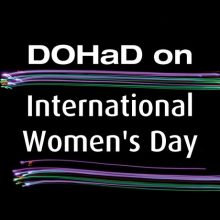Journal of Developmental Origins of Health and Disease on International Women’s Day (2 of 3)
In honour of International Women’s Day, we have launched a dedicated collection of articles from Journal of Developmental Origins of Health and Disease.
In addition to our specially-selected articles, we’d like to share some additional content – a series of Q&A’s with leading figures in the field.
Ilona Koupil

How do you describe your work role? What do you call yourself?
I am an epidemiologist and a public health scientist with main research interests in social and life course epidemiology. My current position is as a Professor of Health Equity Studies/Public Health Medicine with the Stockholm University.
Do you have an overarching career goal? Did you set that goal early, mid or late in your career? Did your goals change over your career?
Since the start of my professional career, I have been trying to contribute to improving child health and reducing social inequalities in health. I am also very motivated to share and develop rigorous and powerful designs for studies in observational epidemiology. I still think these are important tasks and I strive to motivate my students and colleagues to continue to work in this area.
If you were an established PI in 1990, what was your initial impression of Barkers hypothesis?
I most remember being very excited about potential new opportunities to reduce the burden of circulatory disease. I was also a little bit sceptical about the proposed long term causal effects of nutrition in pregnancy on multiple disease outcomes and very intrigued by the largely unknown underlying mechanisms. The new hypothesis and the fast developing research area have made a huge impact on my own life in taking me from paediatrics and perinatal epidemiology directly to geriatrics and creating new career opportunities for my current work in life course research.
What evidence convinced you that there was a basis for the hypothesis?
In early 1990s, I got the opportunity to work with Swedish data and was able to replicate many of the original findings in a different context and with data that included more detailed information on e.g. length of gestation, complications during pregnancy or social characteristics at different stages of the life course. I also think that experimental work, and the accumulated evidence on early life determinants of health that is based on material from many different countries and contexts, are very helpful.
What is your greatest achievement in your career to date?
I am probably most proud of my and my team’s work in extending the Uppsala Birth Cohort Study to include the children, grandchildren and great-grandchildren of the original cohort and to continue the follow-up and investigations of this multigenerational study of Swedish men and women. This unique material made it possible for us to generate some original findings on developmental origins of health and disease and we could also contribute to better understanding of how social inequalities in health emerge and are transferred between generations.
What is your greatest achievement outside your career to date?
I am very proud of my family and my teenage son. I am a keen volunteer at my local sports club (with mediocre own sports achievements).
Looking back, is there an experiment that you wish you had performed 10 years ago?
My team and I have recently started to work more specifically on the developmental origins of women’s health and I wish we had paid more attention to the gender specific effects in our earlier work and had invested more into exploring these systematically.
What has been your biggest challenge in achieving your goals?
My work in social and life course epidemiology means a lot of daily interactions with different academic disciplines and different academic traditions. Interdisciplinary and cross-disciplinary work is fun and a challenge at the same time.
Has science changed over your career?
In my current field of health equity studies, new methods from life course epidemiology have made it possible for us to better integrate important insights from research on social determinants of health with evidence from research on developmental origins of health. I also see growing investments into building better infrastructures for research, more efficient cross-disciplinary and cross-cohort collaborations and exciting innovations in development of methods for analyses of complex data. This gives me a lot of hope that more relevant research can be done in the near future that will both improve population health and also reduce health disparities.
Ilona Koupil holds the principal position as a Professor of Health Equity Studies/Public Health Medicine at the Department of Public Health Sciences, Centre for Health Equity Studies (CHESS), and Stockholm University.







